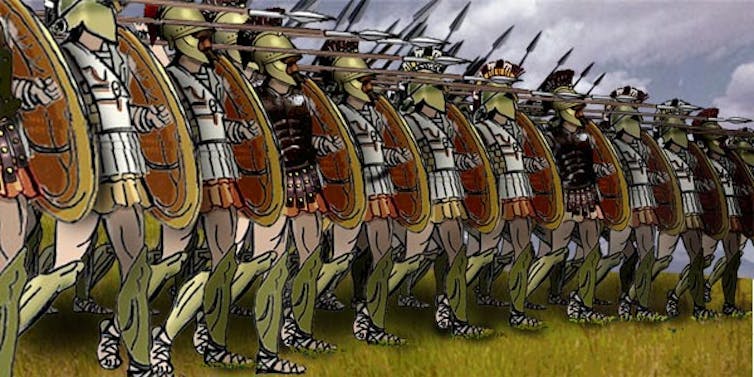European Council president Donald Tusk recently observed that the EU is fundamentally a peace project. Unsurprisingly, perhaps, this comment does not seem to have impressed the self-styled “Spartans” of the Conservative Party’s European Research Group, or their followers.
A combination of libertarianism and bellicose nationalism appears to characterise hard Brexit supporters at this stage. And they are acting as a magnet for groups favouring violent resistance - in word if not always in deed.
The “Spartan” image unites the intellectuals of the ERG with street protesters. Apparently taking inspiration from the comic book history of the graphic novel and film 300, which depicts the heroic resistance of a small group of Spartan hoplite warriors against the invading Persians at the battle of Thermopylae in 480 BC, at least one protester wore a homemade hoplite helmet when Brexit supporters gathered in parliament square on March 29 – what was supposed to have been Brexit day.
It would be pointless simply to condemn the belligerent rhetoric of Brexit supporters, from the ERG downwards. In their perception, pacifism is rooted in timidity; and it is the UK’s supposed timidity in the face of the EU that they seek to overturn. But it is reasonable to wonder whether these neo-Spartans have properly thought their rhetoric through.
The Spartans have long been a byword for courage, strength, grim determination and military might. In his 1750 Discourse on the Moral Effects of the Arts and Sciences, Jean-Jacques Rousseau valorised the martial virtues of the Spartans over the decadence and effeminacy (as he saw it) of the European Enlightenment. However, the great tragedy of Spartan virtue is that while it may have helped the Spartans win wars, it didn’t help them to “win the peace”.
Sparta warred with Athens for 27 years. In contrast to the Spartans, the Athenians were a model of cosmopolitan sophistication, artistic, cultural and philosophical excellence, and political innovation. They were no slouch militarily either. Their navy was dominant throughout the eastern Mediterranean. They were eventually defeated, but while Athens never fully recovered, their opponents were unable to emulate their achievements. It is the Athenians who have left the most indelible mark on history. Their culture echoes through our art, our thought, our science, our architecture, our politics.
The Spartan vision
That the Spartan worldview contains the seeds of its own defeat was pointed out by perhaps the most famous Athenian of them all, Plato. In his last Dialogue, the Laws, Plato sketches an ideal society and plans its legal system and political structure. It is introduced via a three-way discussion between an unnamed Athenian, a Cretan named Cleinias, and a Spartan, Megillus. Their debate provides an extraordinary contemporary insight into how the Spartans actually thought and why ultimately their influence waned.
The Athenian sets out the Spartan viewpoint carefully and respectfully, before pointing out its clear defects. Cleinias and Megillus are agreed that the ultimate purpose of political and legal institutions is military strength. While diplomats may talk of peace, the underlying reality is that all states stand in a constant condition of war with respect to each other. Consequently, the national interest is best served by a constitution designed for the primary purpose of military effectiveness.

The Athenian points out the absurdity of such an arrangement by asking first whether this alleged state of universal war is paralleled in lower-level relationships between villages and households. Cleinias and Megillus affirm that it is. He goes on to ask about individuals. The Cretan and the Spartan response is that the condition of universal war is replicated at all levels, between individuals and even within individuals. The martial virtues of courage, resilience, resoluteness and strength are all achieved through victory in an internal war which we all wage against the softer, gentler, more compromising parts of our own natures.
The Athenian then neatly undermines this martial view of life by pointing out that wars within individuals, between individuals, between households and between villages are all forms of civil war. In civil war, the greatest political leaders are not those who annihilate their opponents, but those who create conditions under which the warring parties can live in peace.
The besetting error of the Spartan (and the Cretan) attitude to politics is that it subordinates legislation for peacetime to the purposes of war. The Athenian’s proposed alternative does not involve the rejection of war under all circumstances, but insists that legislation for war should always serve the purposes of peace.
Running from peace
The Spartans, it seems, had found a way to duck the disquieting questions that arise for any serious politician concerning how to build and maintain a peaceful society in which human life can really flourish. Life for a Spartan is either war or preparation for war. It is lived in headlong flight from the question: how should we live peacefully together?
True to form, the Brexiteer neo-Spartans seem to have a clear idea of what they are fighting against, but little idea of how to go about healing a fractured nation, or living peaceably with their neighbours, if they were to win. Accordingly, their vision of Britain seems to hark back to obsolete imperialistic forms.
The parallels between modern Europe and ancient Greece are fairly slight. Many features of classical Athenian culture strike modern scholars as primitive and alien. But some of the ancient fault lines are still surprisingly relevant. Much of late 19th and early 20th-century European history was appallingly marked by various forms of militaristic “Spartanism”. The latter half of the 20th century, by contrast, has been marked, largely (if by no means exclusively) by the more existentially challenging business of managing peace.
The example of ancient Athens, which was both a great commercial power and a cultural melting pot, has much more to offer modern Britain than does the martial brutality of the Spartans. The Spartan vision is a vision of endless war, born of timidity in the face of endless peace.

